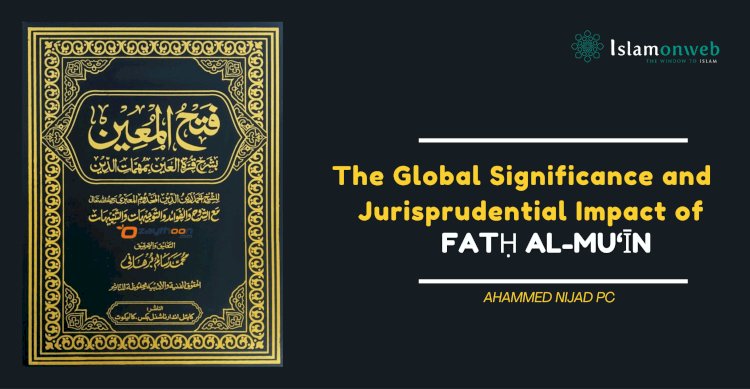The Global Significance and Jurisprudential Impact of Fatḥ al-Mu‘īn
Fatḥ al-Mu‘īn occupies a distinguished position within the hierarchical framework of Shāfiʿī jurisprudence. Authored by the eminent 16th-century Kerala-based scholar Zayn al-Dīn al-Malībārī (d. 987 AH / 1580 CE), also known as Zayn al-Dīn bin ʿAbd al-ʿAzīz al-Maʿbarī, the text stands as one of the most authoritative manuals of fiqh produced in the Indian Ocean region. It is a commentary (sharḥ) on his own earlier work, Qurrat al-ʿAyn, and is especially noted for its clarity, conciseness, and pedagogical utility. Designed primarily as a teaching text in madrasas, it systematically presents the legal positions of the Shāfiʿī school with supporting evidences and accessible structure.
In terms of scholarly positioning, Fatḥ al-Mu‘īn follows the three celebrated commentaries on Imām al-Nawawī’s Minhāj—namely Tuhfat al-Muḥtāj by Ibn Ḥajar al-Haytamī, Mughnī al-Muḥtāj by al-Khaṭīb al-Shirbīnī, and Nihāyat al-Muḥtāj by Shams al-Dīn al-Ramlī. These three form the highest stratum of Shāfiʿī legal commentary and are often cited together as the Mutūn al-Muḥtāj. Remarkably, statements from Fatḥ al-Mu‘īn are often found referenced within the commentaries on these foundational works, attesting to its deep integration and resonance within the wider corpus of Shāfiʿī legal scholarship, not only in the Indian subcontinent but also in Southeast Asia and beyond.
Prominent scholars have shown considerable reliance on Fatḥ al-Mu‘īn, reflecting its far-reaching influence across generations of Shāfiʿī jurists. Among the key works that draw heavily upon it are Bughyat al-Mustarshidīn by ʿAbd al-Raḥmān Mashhūr Bā-ʿAlawī, Ḥāshiyat al-Tuḥfa by ʿAbd al-Ḥamīd Sharwānī, and Kāshifat al-Sajā Sharḥ al-Safīnat al-Najā by Muḥammad Nawawī al-Jāwī.
It is also extensively cited in the Yemeni treatise Fatḥ al-ʿAlīm fī Īlā’ Masā’il al-Tawliyyah wa al-Taḥkīm, authored by Ḥabīb ʿAbd al-Raḥmān ibn Ḥusayn Bā-Faqīh—a noted scholar who penned several authoritative works, including Maṭlab al-Īqāl. His statement, “according to what al-Malībārī stated in Fatḥ al-Mu‘īn,” attests to the text’s enduring authority and legal precision in discussions related to arbitration and other juristic matters.
Furthermore, many commentaries have been authored on Fatḥ al-Mu‘īn, including Iʿānatu al-Ṭālibīn, Iʿānatu al-Mustaghīthīn, and Tarshīḥ al-Mustafīdīn, reinforcing its foundational role in the transmission and application of Shāfiʿī jurisprudence.
The Global Presence of Fatḥ al-Mu‘īn in Libraries and Institutions
Fatḥ al-Mu‘īn continues to be taught and revered among adherents of the Shāfiʿī school of jurisprudence across diverse regions of the world. As a seminal work in Islamic legal thought, it occupies a central place in the curricula of numerous Islamic universities and traditional institutions. Its enduring relevance is evident in its inclusion in the dars sessions of the sacred city of Makkah, the Jāmiʿa al-Umawiyya in Damascus, and the scholarly circles of al-Azhar Mosque in Egypt.
In Syria, the distinguished scholar Shaykh Muḥammad Shukhayr teaches Fatḥ al-Muʿīn alongside its celebrated commentary Iʿānatu al-Ṭālibīn at Jāmiʿa al-Umawiyya. Similarly, the renowned Shaykh Rushdī Salīm al-Qalam delivered extensive lessons on Fatḥ al-Muʿīn and Iʿānatu al-Ṭālibīn in various Syrian mosques, many of which are now available online, continuing to benefit global audiences. In Kuwait, Shaykh Ḥusayn ʿAbd Allāh ʿAlī conducts regular sessions on the text at Masjid ʿUthmān, further attesting to its active scholarly engagement.
The prefaces to the commentaries Iʿānatu al-Ṭālibīn and Tarshīḥ al-Mustafīdīn affirm that Fatḥ al-Muʿīn was extensively taught in the sacred precincts of the Ḥaram. The authors themselves credit their long-standing dars sessions in the Ḥaram as a major influence in the development of their explanatory works. Such evidence underscores the deep-rooted status of Fatḥ al-Muʿīn as a teaching text of choice in Shāfiʿī scholarship.
Across Southeast Asia and East Africa, including Indonesia, Malaysia, Sri Lanka, and Somalia, Fatḥ al-Muʿīn remains an integral component of religious education. In many of these regions, one who has not studied the text is often not regarded as a fully qualified scholar in the Shāfiʿī tradition. Prestigious institutions in Yemen—such as Dār al-Mustafā in Tarīm and Madrasat al-Fatḥ wa al-Imdād—feature Fatḥ al-Muʿīn as a core syllabus text.
The text has been widely printed and distributed in various regions, including India, Egypt, Lebanon, Indonesia, and Yemen. In India, especially among Shāfiʿī adherents, it is considered a foundational fiqh manual. It is taught in leading Islamic seminaries such as Vellore Baqiyath al-Ṣāliḥāt, Jamia Nooriya Pattikkad, Dār al-Hudā Islamic University, and institutions under the Coordination of Islamic Colleges. It is also studied in Arabic colleges and traditional dars circles across South India.
Fatḥ al-Muʿīn is widely acknowledged as an authoritative reference in Islamic legal discourse. It has been accompanied by various commentaries and translations in multiple languages. Of these, Iʿānatu al-Ṭālibīn is particularly well-known and highly regarded among global Shāfiʿī scholars. Additionally, several other commentary works on Fatḥ al-Muʿīn have emerged outside the Indian subcontinent, reflecting the text's international reach. The foundational text upon which Fatḥ al-Muʿīn is based, Qurrat al-ʿAyn, has also received its own independent commentary, underscoring its academic value.
The depth of scholarship in Fatḥ al-Muʿīn reflects the intellectual prowess of its author, Zayn al-Dīn Maqdūm al-Thānī (Zayn al-Dīn bin ʿAbd al-ʿAzīz al-Maʿbarī al-Malībārī), who was renowned for his close scholarly ties with leading figures of his time and his exceptional literary acumen. His works continue to serve as cornerstones of Shāfiʿī jurisprudence. Notably, Fatḥ al-Muʿīn and its commentaries are cited in the World Encyclopedia of Jurisprudence published in Egypt and Kuwait, where they are acknowledged as essential reference texts in Islamic law.
Scholarly Research and Academic Contributions on Fatḥ al-Muʿīn
Academic studies and scholarly discussions on Fatḥ al-Muʿīn have taken place in various universities and research institutions across the Islamic world. These studies have explored the text from multiple angles, including its jurisprudential depth, historical context, commentaries, and global influence. Notable contributions include:
1. Contributions of Zayn al-Dīn Maqdūm in Jurisprudence
A landmark study titled Al-Juhūd al-Fiqhiyyah li’l-Imām Aḥmad Zayn al-Dīn al-Maqdūm al-Malībārī al-Hindī wa-Dawruhu fī Nashr Madhhab al-Shāfiʿī fī Janūb al-Hind (The Juristic Contributions of Imam Aḥmad Zayn al-Dīn al-Maqdūm al-Malībārī and His Role in Spreading the Shāfiʿī School in South India) was presented by Dr. Rafeeque Abdul-Bari Wafi Chekanoor from the Department of Islamic Sharīʿah at the Faculty of Dār al-ʿUlūm, Cairo University, Egypt. The research was supervised by the esteemed Egyptian scholar Dr. ʿAbd al-Raḥīm.
This comprehensive study centres on the legal contributions of Zayn al-Dīn Maqdūm al-Thānī, with a special focus on Fatḥ al-Muʿīn as his most influential work. It explores the historical backdrop of its composition, the foundational sources that shaped its content, and its engagement with various jurisprudential tools and methodologies. The research further examines the text’s commentaries, translations, and poetic renditions, as well as its institutional presence and reception in academic settings. The study has been widely appreciated by Egyptian scholars for its scholarly rigour and authenticity. A Malayalam translation of this research was published in 2014, broadening its reach to the native scholarly community. The work also investigates the influence of Fatḥ al-Muʿīn across different regions and its translation efforts by native scholars.
2. The Growth and Influence of the Shāfiʿī School of Jurisprudence in India
Another important academic contribution is the doctoral research titled The Development and Impact of the Shāfiʿī School of Jurisprudence in India, submitted by Dr. Muhammed Bahaudeen Hudawi at Jamia Millia Islamia, New Delhi. A noted scholar and grandson of the eminent Abul Kamal Qādirī Muḥammad Musliyar, Dr. Bahaudeen Hudawi provides a comprehensive analysis of the historical development, expansion, and localisation of the Shāfiʿī school in India.
The study highlights the intellectual contributions of Indian scholars to the Shāfiʿī tradition, with Fatḥ al-Muʿīn as a focal point. It also underscores the pivotal role of Zayn al-Dīn Maqdūm al-Thānī in embedding the Shāfiʿī school within the Indian scholarly and pedagogical framework. Supervised by Dr. Muhammed Ishaq from the Department of Islamic Studies at Jamia Millia, the research was published in 2014 by Readworthy Publications, New Delhi, and its second edition was later released by Cambridge Scholars Publishing.
3. The Contributions of Keralite Scholars in Jurisprudence
A third doctoral study, conducted by Ḥusayn Saqaffī Chullikkode (Ḥusayn C.S.) under the supervision of Dr. K.V. Veeran Moideen at Calicut University, investigates the juristic legacy of Keralite scholars within the broader Islamic tradition. This research delves into various commentaries, poems, and scholarly treatises composed in relation to Fatḥ al-Muʿīn, highlighting how scholars from Kerala have contributed richly to the preservation, explanation, and propagation of Islamic law.
It showcases the scholarly depth and literary creativity of South Indian ʿulamāʾ, particularly in their efforts to engage with and expand upon the teachings of Fatḥ al-Muʿīn, thus positioning Kerala as a significant centre in the global Shāfiʿī landscape.
4. The Influence of Fatḥ al-Muʿīn in the Socio-Religious Context of Kerala
The impact of Fatḥ al-Muʿīn extends beyond the academic and jurisprudential domains, deeply influencing the socio-religious fabric of the Muslim community in Kerala. A notable study in this regard is The Influence of Fatḥ al-Muʿīn in the Socio-Religious Landscape of Kerala, conducted by Afsal Hudawi Changaramkulam at Jawaharlal Nehru University, New Delhi. The research highlights how Fatḥ al-Muʿīn functions as a key reference in shaping religious practice and legal awareness among Kerala’s Shāfiʿī Muslims.
In addition, several postgraduate-level studies have emerged from institutions such as Wafi and Hudawi in Kerala, offering critical insights into the text and its jurisprudential scope. These works reflect the continuing scholarly engagement with Fatḥ al-Muʿīn and its application in contemporary and classical contexts. Some of the most noteworthy studies include:
- Mustafa Hudawi Delambadi, Explorations in Fatḥ al-Muʿīn: A Comprehensive Study – a detailed examination of the text’s themes, structure, and legal methodologies.
- Usman Wafi, The Significance of Fatḥ al-Muʿīn in the Shāfiʿī School of Jurisprudence – an analysis of the text’s standing within the broader Shāfiʿī tradition.
- Ishaq Wafi, An Analysis of Kaingappara Muḥammad Musliyar’s Commentary on Fatḥ al-Muʿīn – a focused study on the interpretative contributions of a major Keralite scholar.
- Shamsudheen Hudawi, The Impact of Istishḥāb in the Shāfiʿī School of Jurisprudence: Insights from Fatḥ al-Muʿīn – exploring the role of presumption of continuity (istishḥāb) as reflected in the text.
- Shahnas Akbar Hudawi, The Common Jurisprudential Principles in the Ibādāt of Fatḥ al-Muʿīn – an investigation into the legal principles governing acts of worship.
- Abdul Gafoor Hudawi, The Common Jurisprudential Principles in the Muʿāmalāt of Fatḥ al-Muʿīn – a complementary study focusing on social transactions and interpersonal dealings.
- Sharafudheen Hudawi, Approaches to Understanding Modern Masā’il of Muʿāmalāt in Light of Traditional Texts: A Detailed Study Based on Fatḥ al-Muʿīn – bridging classical jurisprudence with contemporary legal issues.
- Mustafa Hudawi, The Taʿlīqāt of Fatḥ al-Muʿīn in Kerala: An In-Depth Examination – a comprehensive review of the marginalia and annotations produced by Kerala’s scholars on the text.
Together, these studies represent a substantial body of academic work devoted to Fatḥ al-Muʿīn, offering both traditional exegesis and modern contextualisation. Given the prominence of the text, it is highly likely that further research is underway at academic institutions across the globe, continuing to expand the understanding and influence of this cornerstone of Shāfiʿī jurisprudence.
Related Scholarly Texts Inspired by Fatḥ al-Muʿīn
In addition to its renowned commentaries, several scholarly texts have emerged in relation to Fatḥ al-Muʿīn, each contributing uniquely to the understanding and dissemination of its jurisprudential content. Among these works are:
Manẓūmat Lubāb al-Farāʾiḍ
Manẓūmat Lubāb al-Farāʾiḍ is a poetic composition that distills and elucidates the laws of inheritance as outlined in Fatḥ al-Muʿīn. Authored by the distinguished scholar Shaykh Muḥammad bin Ḥasan of Vadanappalli (1315–1393 AH), the text employs poetic metre to make complex legal rulings more accessible to students and scholars alike. It was published by al-Murshid Publications, Tirurangadi.
al-Muhimma fī Bayān al-Aʾimma
This work, titled al-Muhimma fī Bayān al-Aʾimma, focuses on the revered imams and scholars referenced in Fatḥ al-Muʿīn. Authored by the renowned scholar Shaykh Kunjāli Musliyar, it offers brief yet insightful biographical entries, detailing the birth, passing, and key contributions of these jurists. This compilation serves as a valuable historical and scholarly reference. It was published by the Student Union of Nadapuram Jāmiʿa al-Falakiyya.
Khulāṣat al-Fiqh al-Islāmī
Initially published as Khulāṣat Fatḥ al-Muʿīn, this work was later reissued in 1993 under the title Khulāṣat al-Fiqh al-Islāmī by the Sunni Educational Board. Authored by Kadampuzha Bāwā Musliyar (ʿAbd al-Raḥmān Musliyar), the text serves as a comprehensive summary of Fatḥ al-Muʿīn, offering essential explanations and key jurisprudential insights. It has proven to be an invaluable aid for students and educators alike in navigating the original text’s intricate legal discussions.
In conclusion, Fatḥ al-Muʿīn holds a central position in Shāfiʿī jurisprudence, influencing both academic discourse and the socio-religious practices of Muslim communities, particularly in regions like Kerala and Yemen. Through its detailed commentaries and associated works—such as Manẓūmat Lubāb al-Farāʾiḍ, al-Muhimma fī Bayān al-Aʾimma, and Khulāṣat al-Fiqh al-Islāmī—its legacy continues to shape legal scholarship and education. The sustained efforts in research, commentary, and publication surrounding Fatḥ al-Muʿīn affirm its lasting significance in the intellectual tradition of Islamic jurisprudence.
About the author
Ahammed Nijad PC, research scholar at the Department of Fiqh and Uṣūl al-Fiqh, Dārul Huda Islamic University.
References:
- Mustafa Hudawi Delambadi. Explorations in Fatḥ al-Muʿīn: A Comprehensive Study.
- Usman Wafi. The Significance of Fatḥ al-Muʿīn in the Shāfiʿī School of Jurisprudence.
- Ishaq Wafi. An Analysis of Kaingappara Muḥammad Musliyar’s Commentary on Fatḥ al-Muʿīn.
- Shamsudheen Hudawi. The Impact of Istishḥāb in the Shāfiʿī School of Jurisprudence: Insights from Fatḥ al-Muʿīn.
- Shahnas Akbar Hudawi. The Common Jurisprudential Principles in the Ibādāt of Fatḥ al-Muʿīn.
- Abdul Gafoor Hudawi. The Common Jurisprudential Principles in the Muʿāmalāt of Fatḥ al-Muʿīn.
- Sharafudheen Hudawi. Approaches to Understanding Modern Masāʾil of Muʿāmalāt in Light of Traditional Texts: A Detailed Study Based on Fatḥ al-Muʿīn.
- Mustafa Hudawi. The Taʿlīqāt of Fatḥ al-Muʿīn in Kerala: An In-Depth Examination.
Disclaimer
The views expressed in this article are the author’s own and do not necessarily mirror Islamonweb’s editorial stance.
























Leave A Comment